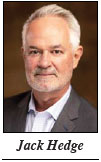Brice Wallace
The person who in three years advanced the Utah Inland Port from a startup to an institutional authority is retiring.
Jack Hedge was hired as executive director in June 2019 and, at his suggestion, in June of this year transitioned to the newly created role of president of the Utah Inland Port Authority. The port authority board on Sept. 7 terminated his employment due to retirement.{mprestriction ids="1,3"}
Board Chair Miles Hansen said before the vote that he was “a little bit surprised by, and also, frankly, disappointed.”
“I know that you have done incredible work over the past few years,” he told Hedge during the board meeting. “We’ve had many conversation about the next phase, and I appreciate your perspective, your expertise, everything you’ve done for the inland port.”
Hansen noted that Hedge had helped new board members during the past few months as they worked on the authority’s next phase.
“And I think it’s absolutely critical for all of us to remember,” Hansen said, “when this thing started, when you came to Utah, there was nothing. There was an idea, there wasn’t a statute, there wasn’t an organization, there wasn’t a team, there wasn’t an office.”
The port authority’s goal is to improve the movement of goods into, out of and through Utah using a statewide, multimodal approach aimed at creating a robust supply chain and establishing a trade and logistics hub for the Intermountain West. Its jurisdictional area includes 16,000 acres in Salt Lake City’s Northwest Quadrant, but it also has pushed for logistics improvements throughout the state. It says one-third of the state’s Utah’s GDP, employment and incomes depend on the logistics system.
In announcing Hedge’s retirement, the authority issued a news release crediting Hedge for, among other things, establishing the original policy, programs and protocols from a startup to a functioning state authority; establishing the authority’s strategic vision; envisioning and establishing a statewide model; creating necessary relationships; providing support in passing two pieces of landmark federal legislation; leading the creation of a strategic business plan; hosting Utah’s first-ever logistics forum; and establishing logistics/supply chain in Utah as a public policy discussion.
During the Sept. 7 meeting, Hansen praised Hedge’s vision, leadership, tenacity and “your willingness to shovel the whatever-needed-to-be-shoveled to get things done and move things forward.”
Hansen said it will be up to others to take “this little startup that you’ve created and fostered and nurtured, and then institutionalize it and move it forward in a way that’s going to continue to have a generational impact here in the state.”
Hedge’s last day at the authority will be Oct. 28. He said his retirement was “a tough decision to come to, but I do think the timing’s right.” The authority will need to “really step forward and step out into its next phase,” he said, adding that he will continue to champion the port authority.
Hedge was hired as the executive director of UIPA in June 2019, coming from the Port of Los Angeles. In June, the board decided that Hedge as president would focus on leading the authority’s external engagement with industry leaders across the country and around the world. The new UIPA executive director would be responsible for leading the development of the authority’s business strategy and plans, building and managing the UIPA team and overseeing the development of business cases for ongoing and future authority projects.
The board recently appointed Ben Hart as executive director. His experience includes working in the private sector and in local and state government, most recently serving as deputy director of the Governor’s Office of Economic Opportunity (Go Utah).
Since joining UIPA, Hedge has been the point man for much of the public’s criticism of the authority, including its very existence. Critics have opposed the authority’s creation and development based on their worries about heavier traffic congestion, air quality issues and possible long-term health concerns associated with them, and land-use authority issues, among others.
Board member Abby Osborne noted that board meetings had advanced from having Utah Highway Patrol officers deal with angry protestors “to a really calm process” because of Hedge’s vision and leadership and the team he created.
Board member Jerry Stevenson, a Republican state senator from Layton, said the state had created a political board when it needed a business board. “And you’re a business guy, and I think in some ways you’ve been put through a difficult situation,” Stevenson said.
The board meetings now are less-raucous but not without criticism. During the public comment portion of the Sept. 7 board meeting, speakers complained that the board was not following its own policies related to public participation, documentation and closed-door sessions, and raised environmental issues related to the Great Salt Lake. One commenter even chided Hansen for noting that a commenter timed her remarks to exactly the allotted two minutes.
Board member Dan Hemmert said he was “surprised and disappointed” to hear Hedge was retiring. Hemmert said he saw Hedge take “something that was nothing” and “turn it into something that it is today, and we’re optimistic for what it can be tomorrow, but it’s because of what you’ve done over the past few years.”{/mprestriction}








